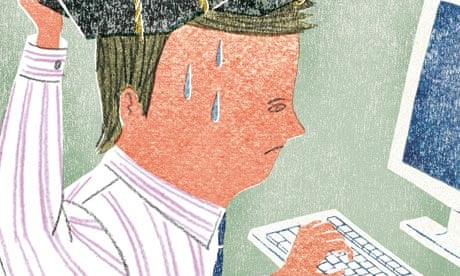The Protestant work ethic, as every first-year sociology student knows, is what made western capitalism so (for want of a better word) great. When it comes to accumulating profit, what could be more perfect than hard work, self-denial, plus the threat of eternal damnation for the lazy? Then, when Europe got too comfortable, the Puritans left for America to work even harder and self-deny more vigorously, culminating triumphantly in the corporate culture that brought you the Furby, aerosol cheese and Crocs. These days, if you consider yourself lazy or a procrastinator – who doesn't, in some area of life? – you almost certainly share some vestige of this moralism and use it to chastise yourself. Effort is key. Even failure is acceptable, so long as you tried your hardest.
The problem with this isn't just that it's self-flagellatingly harsh. The bigger issue – and the reason, I'm convinced, so much anti-procrastination advice is either useless or only briefly effective – is that "effort" is one of those concepts to which there's less than meets the eye. What does it really mean to "put in more effort"? For some manual work, perhaps a brute-strength definition is best: it takes more effort to haul 20 bricks at once than 10. (Two hods are better than one!) For everyone else, it's far murkier. Sometimes, it just means "putting in more time". But often it's something surprisingly physical: when I sit down with the determination to "put in some effort", I scrunch the muscles in my face and forehead; I stare extra-hard at the screen; I tense my shoulders. "We are forever scratching our heads, clenching our fists and jaws, holding our breath, and tightening our rectal muscles, in order to will or to keep control of our feelings," observed the philosopher Alan Watts. Needless to say, these bodily contractions don't help get stuff done. But they leave us tired and achy, thus satisfying the implicit logic of the Protestant work ethic: if it's hurting, it must be working.
More counterproductively still, we confuse effort with worry. "We don't correlate our sense of responsibility with what we are actually producing. We correlate it with how hard we are being on ourselves," the social entrepreneur Dan Pallotta wrote in a recent Harvard Business Review blogpost. "I can hunch over my computer screen for half the day churning frenetically through emails without getting much of substance done, all the while telling myself what a loser I am, and leave at 6pm feeling like I put in a full day. And given my level of mental fatigue, I did!"
Which is one reason telling yourself to put in more effort won't defeat procrastination: that hectoring inner voice thinks it's fighting laziness when in fact it's getting in the way, substituting bad feeling for useful endeavour – against which, to make things worse, our hedonistic sides rebel. "Telling yourself 'you have to' will provoke an inner conflict that divides your energies, blocks motivation, and will make [tasks] more difficult," argues Neil Fiore in his new book The Now Habit At Work. (His excellent original work, The Now Habit, was aimed at students.) Instead, firmly schedule plenty of free-time activities you truly enjoy: weaken the Puritan link between "working hard" and "making life awful", and the work part gets easier, too. The Puritans, Pallotta concedes, "had a strong work ethic. [But] they also burned witches at the stake... We need new role models."
